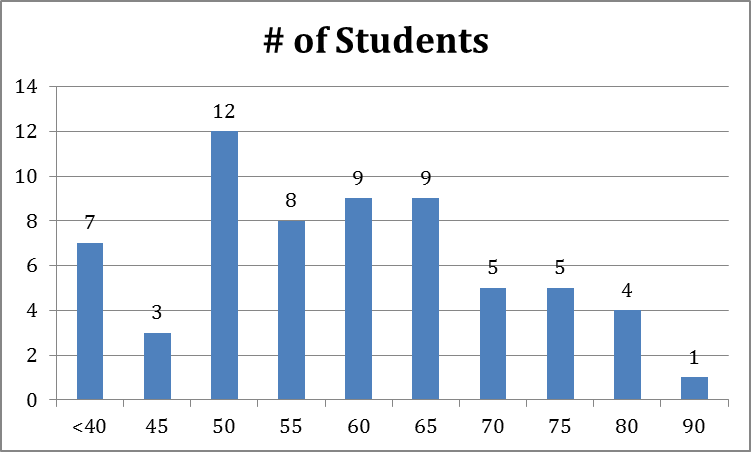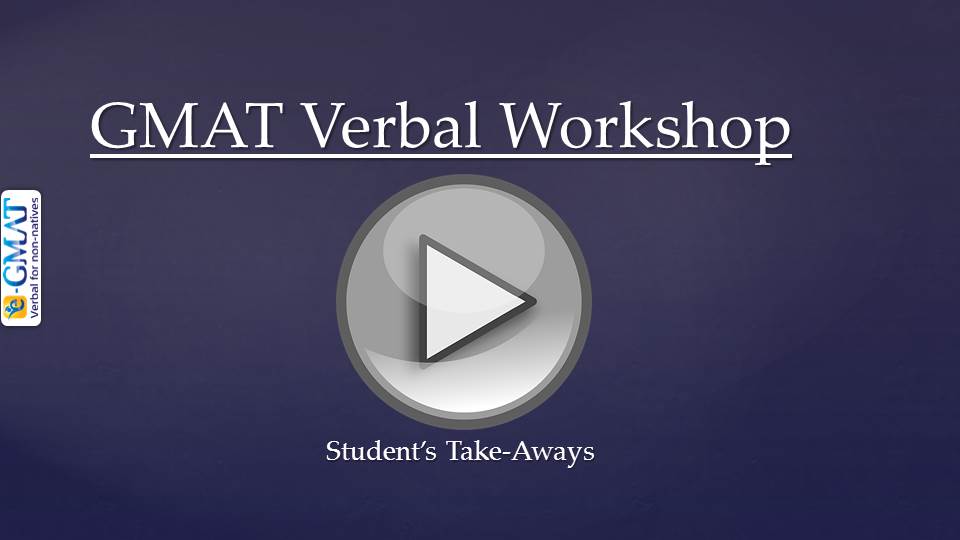Events & Promotions
|
|

GMAT Club Daily Prep
Thank you for using the timer - this advanced tool can estimate your performance and suggest more practice questions. We have subscribed you to Daily Prep Questions via email.
Customized
for You
Track
Your Progress
Practice
Pays
Not interested in getting valuable practice questions and articles delivered to your email? No problem, unsubscribe here.
- Nov 20
07:30 AM PST
-08:30 AM PST
Learn what truly sets the UC Riverside MBA apart and how it helps in your professional growth - Nov 20
01:30 PM EST
-02:30 PM IST
Learn how Kamakshi achieved a GMAT 675 with an impressive 96th %ile in Data Insights. Discover the unique methods and exam strategies that helped her excel in DI along with other sections for a balanced and high score. - Nov 19
12:30 PM EST
-01:30 PM EST
Learn how Keshav, a Chartered Accountant, scored an impressive 705 on GMAT in just 30 days with GMATWhiz's expert guidance. In this video, he shares preparation tips and strategies that worked for him, including the mock, time management, and more - Nov 22
11:00 AM IST
-01:00 PM IST
Do RC/MSR passages scare you? e-GMAT is conducting a masterclass to help you learn – Learn effective reading strategies Tackle difficult RC & MSR with confidence Excel in timed test environment - Nov 23
11:00 AM IST
-01:00 PM IST
Attend this free GMAT Algebra Webinar and learn how to master the most challenging Inequalities and Absolute Value problems with ease. - Nov 24
07:00 PM PST
-08:00 PM PST
Full-length FE mock with insightful analytics, weakness diagnosis, and video explanations! - Nov 25
10:00 AM EST
-11:00 AM EST
Prefer video-based learning? The Target Test Prep OnDemand course is a one-of-a-kind video masterclass featuring 400 hours of lecture-style teaching by Scott Woodbury-Stewart, founder of Target Test Prep and one of the most accomplished GMAT instructors.
Kudos
Bookmarks
GMAT Verbal Workshop
Decoding the X factor that separates winners
A few weeks back we asked ourselves, “How we can make our courses even better?” The answer was simple – help your students be more successful. Hence, to do the same, we introduced two new workshops – Sentence Correction and GMAT Verbal. While most test prep companies including e-GMAT teach people concepts and application and provide ample practice and mocks, few companies teach how to take the test, manage your mental state, and make decisions during the exam maximize your potential. The Verbal workshop was a step in that direction.
This article presents an account of our experience with the Verbal Workshop, recounts the aha moments and the revelations that the students had, and discusses the improvements that we may make in the upcoming workshops.
The Verbal workshop was designed to bridge the gap between the students’ true potential and their performance on the real test, helping our students put their best foot forward. Our hypothesis was simple - People improve best when three things happen, that is when they:
1. Realize the need to improve.
2. Understand where (the areas) they need to improve.
3. Get a clear direction on how to improve.
HOW WAS THE WORKSHOP CONDUCTED?
Conducted by 5 e-GMAT experts, the workshop included a timed mini-mock test with 20 grueling verbal questions on Sentence Correction, Critical Reasoning, and Reading Comprehension. Click here to learn more about this workshop. Each question on the test was carefully hand-made by e-GMAT experts. Over 150 hours of work were put in designing this workshop.
=> 20 questions, 5 points per question, 42 minutes
=> All GMAT like questions, hand-made, fresh
=> Eligibility: Recommended minimum verbal score – 32
=> Non adaptive test
WHO WAS THIS WORKSHOP FOR?
The pre-requisite for attending this work was the verbal score in the range of 32-40 (on a scale of 60) in the recent mock test. Students scoring less than 30 on their mock tests were not encouraged to attend the workshop.
Overall, the goal was to treat this workshop as an exercise similar to that of answering first 20 questions on the exam. Each question was awarded 5 points, leading to a maximum of 100 points. 63 students participated in this workshop.
WORKSHOP STATS
The mean mini-mock test score of the group as a whole was 57, while the median score was 60. The standard deviation was 16 points. 95% of the students were within 2 standard deviations of the mean score. The score distribution has been provided below.
=> Mean score = 57
=> Standard deviation = 16
=> Eligibility: Recommended minimum verbal score – 32
=> Non adaptive test

Insights
Further analysis led to some very interesting insights. First of all, we realized that students in general performed better on the first 10 questions than on the last 10 questions. The average accuracy of the group as a whole for the first 10 questions was 70% while the average accuracy of the group for the last 10 was 43%. Upon further discussions, two things stood out:
1. Students who spent too much time on the first 10 questions realized that they had to rush through the last 10, impacting their accuracy.
2. There was an extremely difficult RC in the last 10 questions that consumed a lot of time. Students who were short of time were negatively impacted by that RC in two ways:
=>They tried to rush through the RC and ended up answeringmost RC questions incorrectly.
=>The RC passage shook their confidence, negatively impacting their accuracy on the subsequent questions.
ACTIONS DIFFERENT FROM WORDS – SEPARATING THE WINNERS
Most of these students had taken complete mocks, had been preparing for months, and were completely aware of the best practices, yet they failed to execute on the same. Here are three broad failure mechanisms that we uncovered:
1. Focusing on question at hand: Students were aware that once they attempt one particular question they should let go of it. Yet, many students were unable to do so. As you would read in the students’ take-aways, many students could not move on with a clear mind when they face a challenging question. Remember, GMAT is also about performing in a stressful situation.
2. Managing Timing: Many students were aware of the best practices on managing timing on the first 10 question and so on, yet they ended up spending more time than recommended, some up to 65% of the time on the first 10.
3. Leveraging their strengths: Worse still, there were students who said that they would not hesitate to skip question, if required, so that they can spend more time on sections that they were strong in. Yet many students failed to do just the same.
COMMON THEMES IN PERSONALIZED FEEDBACK
Many students who scored below 60 faltered because of one or more factors stated above. Note, that the factors above have little to do with a student’s ability on Verbal section but everything to do with the decisions he/she made while taking the mock test.
The important thing to notice is that the conclusions above were arrived at not only based on our hypothesis but also based on our detailed discussions with the students immediately after they attempted the quiz. In fact, when asked one thing that they would do differently, majority of them mentioned about 1 or more of the three factors above. Click the link below for some of the snippets from students.
This led us to conclude that what separates those who ace the Verbal section from those who merely do ok is not only the knowledge of concepts but also the ability to execute during the exam. We hope in addition to helping students on the former, this workshop helps students with the latter.

THE PRIZE - PERSONALIZED ASSESSMENT AND NEXT STEPS
Overall, this workshop required lot of work. During the workshop, five experts spent 4 hours addressing students’ queries and making sure that everyone was able to take useful pointers as next steps. To prepare, e-GMAT team put in 150 hours, coordinating across 3 time zones. Was this effort worth it?? I am sure that our students would think so and even if it helps them improve a mere 10 points, then I could not agree more. I would like our students to chime in.
Decoding the X factor that separates winners
A few weeks back we asked ourselves, “How we can make our courses even better?” The answer was simple – help your students be more successful. Hence, to do the same, we introduced two new workshops – Sentence Correction and GMAT Verbal. While most test prep companies including e-GMAT teach people concepts and application and provide ample practice and mocks, few companies teach how to take the test, manage your mental state, and make decisions during the exam maximize your potential. The Verbal workshop was a step in that direction.
This article presents an account of our experience with the Verbal Workshop, recounts the aha moments and the revelations that the students had, and discusses the improvements that we may make in the upcoming workshops.
The Verbal workshop was designed to bridge the gap between the students’ true potential and their performance on the real test, helping our students put their best foot forward. Our hypothesis was simple - People improve best when three things happen, that is when they:
1. Realize the need to improve.
2. Understand where (the areas) they need to improve.
3. Get a clear direction on how to improve.
HOW WAS THE WORKSHOP CONDUCTED?
Conducted by 5 e-GMAT experts, the workshop included a timed mini-mock test with 20 grueling verbal questions on Sentence Correction, Critical Reasoning, and Reading Comprehension. Click here to learn more about this workshop. Each question on the test was carefully hand-made by e-GMAT experts. Over 150 hours of work were put in designing this workshop.
=> 20 questions, 5 points per question, 42 minutes
=> All GMAT like questions, hand-made, fresh
=> Eligibility: Recommended minimum verbal score – 32
=> Non adaptive test
WHO WAS THIS WORKSHOP FOR?
The pre-requisite for attending this work was the verbal score in the range of 32-40 (on a scale of 60) in the recent mock test. Students scoring less than 30 on their mock tests were not encouraged to attend the workshop.
Overall, the goal was to treat this workshop as an exercise similar to that of answering first 20 questions on the exam. Each question was awarded 5 points, leading to a maximum of 100 points. 63 students participated in this workshop.
WORKSHOP STATS
The mean mini-mock test score of the group as a whole was 57, while the median score was 60. The standard deviation was 16 points. 95% of the students were within 2 standard deviations of the mean score. The score distribution has been provided below.
=> Mean score = 57
=> Standard deviation = 16
=> Eligibility: Recommended minimum verbal score – 32
=> Non adaptive test

Insights
Further analysis led to some very interesting insights. First of all, we realized that students in general performed better on the first 10 questions than on the last 10 questions. The average accuracy of the group as a whole for the first 10 questions was 70% while the average accuracy of the group for the last 10 was 43%. Upon further discussions, two things stood out:
1. Students who spent too much time on the first 10 questions realized that they had to rush through the last 10, impacting their accuracy.
2. There was an extremely difficult RC in the last 10 questions that consumed a lot of time. Students who were short of time were negatively impacted by that RC in two ways:
=>They tried to rush through the RC and ended up answeringmost RC questions incorrectly.
=>The RC passage shook their confidence, negatively impacting their accuracy on the subsequent questions.
ACTIONS DIFFERENT FROM WORDS – SEPARATING THE WINNERS
Most of these students had taken complete mocks, had been preparing for months, and were completely aware of the best practices, yet they failed to execute on the same. Here are three broad failure mechanisms that we uncovered:
1. Focusing on question at hand: Students were aware that once they attempt one particular question they should let go of it. Yet, many students were unable to do so. As you would read in the students’ take-aways, many students could not move on with a clear mind when they face a challenging question. Remember, GMAT is also about performing in a stressful situation.
2. Managing Timing: Many students were aware of the best practices on managing timing on the first 10 question and so on, yet they ended up spending more time than recommended, some up to 65% of the time on the first 10.
3. Leveraging their strengths: Worse still, there were students who said that they would not hesitate to skip question, if required, so that they can spend more time on sections that they were strong in. Yet many students failed to do just the same.
COMMON THEMES IN PERSONALIZED FEEDBACK
Many students who scored below 60 faltered because of one or more factors stated above. Note, that the factors above have little to do with a student’s ability on Verbal section but everything to do with the decisions he/she made while taking the mock test.
The important thing to notice is that the conclusions above were arrived at not only based on our hypothesis but also based on our detailed discussions with the students immediately after they attempted the quiz. In fact, when asked one thing that they would do differently, majority of them mentioned about 1 or more of the three factors above. Click the link below for some of the snippets from students.
This led us to conclude that what separates those who ace the Verbal section from those who merely do ok is not only the knowledge of concepts but also the ability to execute during the exam. We hope in addition to helping students on the former, this workshop helps students with the latter.

THE PRIZE - PERSONALIZED ASSESSMENT AND NEXT STEPS
Overall, this workshop required lot of work. During the workshop, five experts spent 4 hours addressing students’ queries and making sure that everyone was able to take useful pointers as next steps. To prepare, e-GMAT team put in 150 hours, coordinating across 3 time zones. Was this effort worth it?? I am sure that our students would think so and even if it helps them improve a mere 10 points, then I could not agree more. I would like our students to chime in.
Archived Topic
Hi there,
This topic has been closed and archived due to inactivity or violation of community quality standards. No more replies are possible here.
Where to now? Join ongoing discussions on thousands of quality questions in our Verbal Questions Forum
Still interested in this question? Check out the "Best Topics" block below for a better discussion on this exact question, as well as several more related questions.
Thank you for understanding, and happy exploring!
Kudos
Bookmarks
Chance to attend the Verbal Workshop for free!!
Hey folks!
Since its introduction, the Verbal Workshop has helped many students reach their true potential and ace the GMAT. (Here is the story of a student who crossed the V40 barrier. Similarly, here is a student who improved by 120 points.)
Win a chance to attend this Verbal Workshop for free!!

Free Webinar - Master Prethinking to Ace GMAT Critical Reasoning:
We are conducting a Free Webinar - “Master Prethinking to Ace GMAT Critical Reasoning” – on March 2, 2014, 7:00 AM PST (8:30 PM IST). You can also win a chance to attend our Verbal Workshop for free
In addition to learning how to prethink, in this webinar you will also learn to:
a. Understand precision - CR assumptions are precise. Learn how to reject incorrect answer choices that may seem correct.
b. Apply Negation - Learn how to apply the negation test on the most challenging arguments.
As a warm up for this session, try this question:
the-popular-view-is-that-ozone-layer-s-depletion-tough-one-146726.html
Also, we will select three attendees and give them a chance to attend the Verbal Workshop (worth $49) for free! (Here is the story of a student who crossed the V40 barrier. Similarly, here is a student who improved by 120 points.)
So, hurry up. Register here for the Free Webinar before the seats get filled up.
Cheers!!
Kudos
Bookmarks
Click here to register for the webinar and win a chance to attend the Verbal Workshop (worth $49) for free!!
Registrations are done on a first come, first served basis.
So hurry up before the seats get filled!
Registrations are done on a first come, first served basis.
So hurry up before the seats get filled!









